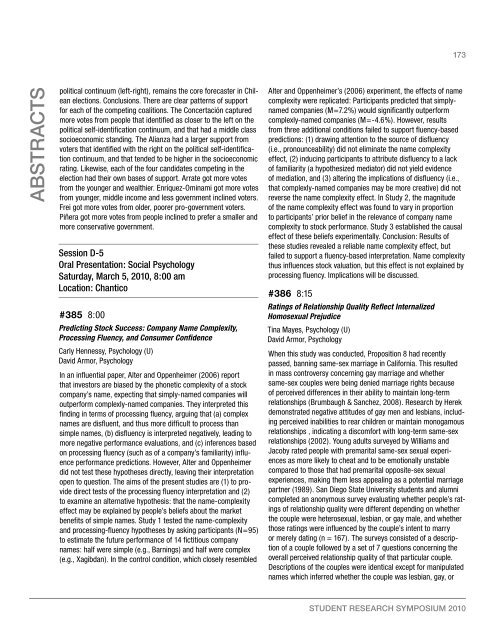STUDENT RESEaRch SympoSiUm 2010 - Graduate and Research ...
STUDENT RESEaRch SympoSiUm 2010 - Graduate and Research ...
STUDENT RESEaRch SympoSiUm 2010 - Graduate and Research ...
Create successful ePaper yourself
Turn your PDF publications into a flip-book with our unique Google optimized e-Paper software.
AbstrActs<br />
political continuum (left-right), remains the core forecaster in Chilean<br />
elections. Conclusions. There are clear patterns of support<br />
for each of the competing coalitions. The Concertación captured<br />
more votes from people that identified as closer to the left on the<br />
political self-identification continuum, <strong>and</strong> that had a middle class<br />
socioeconomic st<strong>and</strong>ing. The Alianza had a larger support from<br />
voters that identified with the right on the political self-identification<br />
continuum, <strong>and</strong> that tended to be higher in the socioeconomic<br />
rating. Likewise, each of the four c<strong>and</strong>idates competing in the<br />
election had their own bases of support. Arrate got more votes<br />
from the younger <strong>and</strong> wealthier. Enríquez-Ominami got more votes<br />
from younger, middle income <strong>and</strong> less government inclined voters.<br />
Frei got more votes from older, poorer pro-government voters.<br />
Piñera got more votes from people inclined to prefer a smaller <strong>and</strong><br />
more conservative government.<br />
Session D-5<br />
Oral Presentation: Social Psychology<br />
Saturday, March 5, <strong>2010</strong>, 8:00 am<br />
Location: Chantico<br />
#385 8:00<br />
Predicting Stock Success: Company Name Complexity,<br />
Processing Fluency, <strong>and</strong> Consumer Confidence<br />
Carly Hennessy, Psychology (U)<br />
David Armor, Psychology<br />
In an influential paper, Alter <strong>and</strong> Oppenheimer (2006) report<br />
that investors are biased by the phonetic complexity of a stock<br />
company’s name, expecting that simply-named companies will<br />
outperform complexly-named companies. They interpreted this<br />
finding in terms of processing fluency, arguing that (a) complex<br />
names are disfluent, <strong>and</strong> thus more difficult to process than<br />
simple names, (b) disfluency is interpreted negatively, leading to<br />
more negative performance evaluations, <strong>and</strong> (c) inferences based<br />
on processing fluency (such as of a company’s familiarity) influence<br />
performance predictions. However, Alter <strong>and</strong> Oppenheimer<br />
did not test these hypotheses directly, leaving their interpretation<br />
open to question. The aims of the present studies are (1) to provide<br />
direct tests of the processing fluency interpretation <strong>and</strong> (2)<br />
to examine an alternative hypothesis: that the name-complexity<br />
effect may be explained by people’s beliefs about the market<br />
benefits of simple names. Study 1 tested the name-complexity<br />
<strong>and</strong> processing-fluency hypotheses by asking participants (N=95)<br />
to estimate the future performance of 14 fictitious company<br />
names: half were simple (e.g., Barnings) <strong>and</strong> half were complex<br />
(e.g., Xagibdan). In the control condition, which closely resembled<br />
173<br />
Alter <strong>and</strong> Oppenheimer’s (2006) experiment, the effects of name<br />
complexity were replicated: Participants predicted that simplynamed<br />
companies (M=7.2%) would significantly outperform<br />
complexly-named companies (M=-4.6%). However, results<br />
from three additional conditions failed to support fluency-based<br />
predictions: (1) drawing attention to the source of disfluency<br />
(i.e., pronounceability) did not eliminate the name complexity<br />
effect, (2) inducing participants to attribute disfluency to a lack<br />
of familiarity (a hypothesized mediator) did not yield evidence<br />
of mediation, <strong>and</strong> (3) altering the implications of disfluency (i.e.,<br />
that complexly-named companies may be more creative) did not<br />
reverse the name complexity effect. In Study 2, the magnitude<br />
of the name complexity effect was found to vary in proportion<br />
to participants’ prior belief in the relevance of company name<br />
complexity to stock performance. Study 3 established the causal<br />
effect of these beliefs experimentally. Conclusion: Results of<br />
these studies revealed a reliable name complexity effect, but<br />
failed to support a fluency-based interpretation. Name complexity<br />
thus influences stock valuation, but this effect is not explained by<br />
processing fluency. Implications will be discussed.<br />
#386 8:15<br />
Ratings of Relationship Quality Reflect Internalized<br />
Homosexual Prejudice<br />
Tina Mayes, Psychology (U)<br />
David Armor, Psychology<br />
When this study was conducted, Proposition 8 had recently<br />
passed, banning same-sex marriage in California. This resulted<br />
in mass controversy concerning gay marriage <strong>and</strong> whether<br />
same-sex couples were being denied marriage rights because<br />
of perceived differences in their ability to maintain long-term<br />
relationships (Brumbaugh & Sanchez, 2008). <strong>Research</strong> by Herek<br />
demonstrated negative attitudes of gay men <strong>and</strong> lesbians, including<br />
perceived inabilities to rear children or maintain monogamous<br />
relationships , indicating a discomfort with long-term same-sex<br />
relationships (2002). Young adults surveyed by Williams <strong>and</strong><br />
Jacoby rated people with premarital same-sex sexual experiences<br />
as more likely to cheat <strong>and</strong> to be emotionally unstable<br />
compared to those that had premarital opposite-sex sexual<br />
experiences, making them less appealing as a potential marriage<br />
partner (1989). San Diego State University students <strong>and</strong> alumni<br />
completed an anonymous survey evaluating whether people’s ratings<br />
of relationship quality were different depending on whether<br />
the couple were heterosexual, lesbian, or gay male, <strong>and</strong> whether<br />
those ratings were influenced by the couple’s intent to marry<br />
or merely dating (n = 167). The surveys consisted of a description<br />
of a couple followed by a set of 7 questions concerning the<br />
overall perceived relationship quality of that particular couple.<br />
Descriptions of the couples were identical except for manipulated<br />
names which inferred whether the couple was lesbian, gay, or<br />
<strong>STUDENT</strong> RESEARCH SYMPOSIUM <strong>2010</strong>


